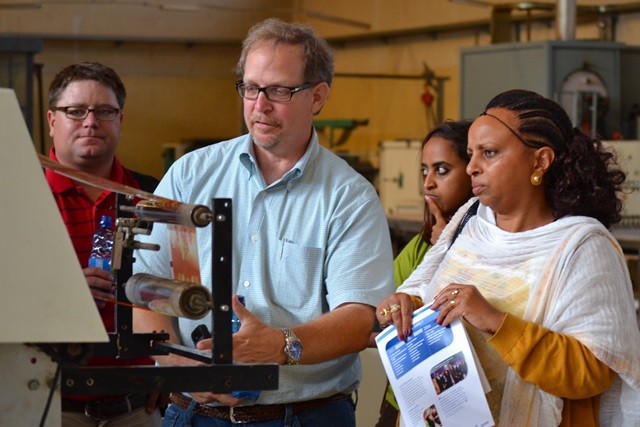
For Immediate Release
Addis Ababa, Ethiopia -- Key stakeholders from the wheat flour industry came together today to celebrate business growth and share learnings from three years of engagement under the African Alliance for Improved Food Processing activity, a public-private partnership between the United States Agency for International Development, Partners in Food Solutions and TechnoServe. The activity worked with Ethiopia’s commercial wheat millers, producers of fortified blended foods and flours, bakeries, and pasta manufacturers to expand wheat flour fortification in Ethiopia.
Chronic food insecurity and malnutrition are grave problems in Ethiopia, where two out of every five children suffer from stunting, which means a lack of food and critical nutrients that impact their physical and mental growth. Although the country’s economy is based largely on agriculture, millions of people require humanitarian assistance to survive. The availability of nutritious fortified wheat, a dietary staple in Ethiopia, is one-step toward expanding access to nutritious food and reducing hunger.
The activity harnessed the global technical expertise of international food processors including General Mills, Cargill, Royal DSM and Buhler to expand the skills of Ethiopia’s growing food processing industry. Over a three-year period, the activity supported 20 medium and large millers and processors to implement quality management systems, national standards and certification requirements; develop processes and nutritious food products tailored to market demand; strengthen financial systems; and improve business efficiencies. The activity trained staff members from 165 food processing companies and two government regulatory agencies on technical and business subjects such as wheat flour fortification, quality management systems, food safety, and national standards.
Growth and expansion of the supported businesses brought Ethiopia the first locally produced fortified wheat flour, ensured sustainable sourcing of wheat from nearly 500,000 farmers, availed multi-grain nutritious bread to the public, and facilitated access to land for expansion by farmer-owned wheat milling cooperatives. Notably, the activity hosted the President of the United States in one of the supported business sites, under the U.S. Government’s Feed the Future initiative, to showcase sustainable production of fortified weaning baby foods.
“This alliance, which we are celebrating today, is very central to our partnership in Ethiopia and the Feed the Future initiative, and USAID is committed to supporting these efforts in the future,” said USAID Ethiopia Acting Mission Director Gary Robbins.
Given the successful implementation, the activity has partnered with Micronutrient Initiative and received an eight-month extension funding from USAID under a regional program to support an additional six wheat flour millers toward wheat flour fortification and offer technical assistance to dairy processors.
See also
Press Release AAIFP Forum 10-8-15 [PDF, 25kb]
USAID Remarks AAIFP Forum 10-8-15 [PDF, 199kb]







Comment
Make a general inquiry or suggest an improvement.